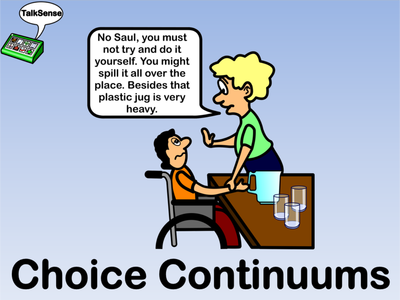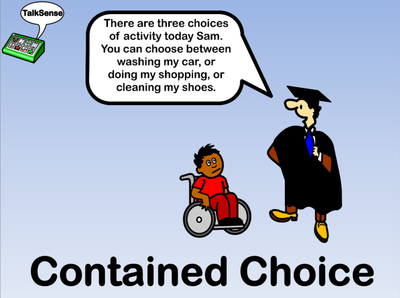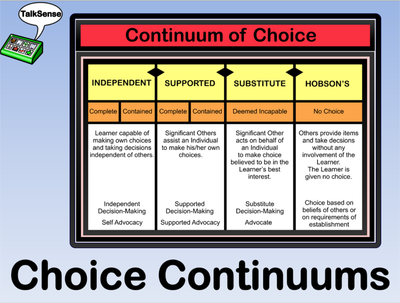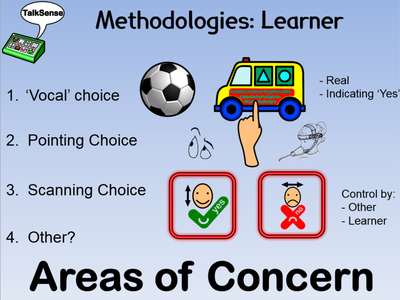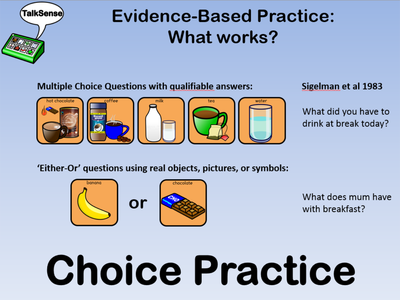Developing Choice for Severe and Profound Learning Difficulties

Choice: What is it?
How important is choice in the special education classroom?
What does choice look like when the individual in question is experiencing Profound and Multiple Learning Difficulties?
How can you tell if a choice has really been made?
How do you go about teaching choice making skills?
How do you evaluate your practice?
This course addreses each of the above questions and aims to provide some answers that will be of practical use back in your workplace.
How important is choice in the special education classroom?
What does choice look like when the individual in question is experiencing Profound and Multiple Learning Difficulties?
How can you tell if a choice has really been made?
How do you go about teaching choice making skills?
How do you evaluate your practice?
This course addreses each of the above questions and aims to provide some answers that will be of practical use back in your workplace.
Description Of Course

This course outlines best practice in the development of choice in the special education classroom and beyond.
The day begins with an examination of the definiton of choice.
The largest portion of the morning is given over to explaining the issues surrounding choice in the classroom and exploring ways in which it might be possible to address them
Participants may be required to work in small groups on given tasks at specific points during the day and to share their results with everyone attending.
The afternoon is given over to 'choice practice'; that is, what might be consider good practice in the development of choice making skills in the special education environment.
The presentation is comprehensive comprising some 160 slides including several short video clips used to illustrate specific areas.
Previous course participants have commented that they think their current present practice is falling short of that suggested on the course. Some have been in contact following their course to discuss strategies especially in relation to specific, challenging Learners.
"Great course Tony. It made me think about my practice and gave me a number of ideas that I am going to try and implement as soon as I get back to work!" (J.L., Birmingham)
The day begins with an examination of the definiton of choice.
The largest portion of the morning is given over to explaining the issues surrounding choice in the classroom and exploring ways in which it might be possible to address them
Participants may be required to work in small groups on given tasks at specific points during the day and to share their results with everyone attending.
The afternoon is given over to 'choice practice'; that is, what might be consider good practice in the development of choice making skills in the special education environment.
The presentation is comprehensive comprising some 160 slides including several short video clips used to illustrate specific areas.
Previous course participants have commented that they think their current present practice is falling short of that suggested on the course. Some have been in contact following their course to discuss strategies especially in relation to specific, challenging Learners.
"Great course Tony. It made me think about my practice and gave me a number of ideas that I am going to try and implement as soon as I get back to work!" (J.L., Birmingham)
Course Objectives

Course Participants will be able to …
- define choice;
- comprehend the issues surrounding choice in the special education environment;
- develop practice to avoid 'assumptions of understanding';
- address choice making skills with their Learners.
What level of ability does the course address?

While primarily aimed at Learners experiencing Profound and Multiple Learning Difficulties, many areas covered on this course are applicable to all forms of Learning Difficulty.
This course is suitable whether working with children or adults.
Skill level of attendees

People attending this course require no prior knowledge in order to benefit, although experience in working with Learners experiencing PMLD is preferable.
Requirements

There are no specific requirements for people attending this course. Attendees may wish to bring a pen and some paper to take notes.
Participants may wish to bring a memory stick with them so as to take away the course PowerPoint presentation at the end of the day. An edited version of the presentation PowerPoint will also be made available to all those attending as a download (from home after the course) should you not bring a memory stick.
Participants may wish to bring a memory stick with them so as to take away the course PowerPoint presentation at the end of the day. An edited version of the presentation PowerPoint will also be made available to all those attending as a download (from home after the course) should you not bring a memory stick.
Course Outline

Participants should aim to arrive between 8:30 and 9:30 for registration and tea/coffee. The course will commence at 9:30 prompt and the presenter will not delay for late comers. Times below are an approximate guide to the day and may vary considerably. Where the course is closed to outsiders, times may be decided by the booking agency.
At the close of the course at 4:00 pm, participants may leave or stay for further tuition dependng on the requirements of the venue and at the discretion of the course tutor. Additional assistance and support will be given to course attendees by e-mail in the weeks following the course as necessary.
The course will detail the issues around practice in the development of choice for Individuals Experiencing PMLD. Course participants will be guided through many of the issues & techniques involved in this approach. By the close of the course, participants should have a better understanding of good practice in their delivery of choice within their own environment.
08:30 Arrival, Registration. Tea and Coffee
09:30 Introduction
09:50 What is choice?
10:10 Is Choice a good thing?
10:20 Choice Continuums
10:30 Break for Tea or Coffee
10:45 Evidence Based Practice
10.55 Areas of Concern
11:00 Assumptions Of Understanding
12:00 Lunch
13:00 Choice Practice
15:30 Staged approaches (time permitting)
16:00 Q & A Close of Course
After the course closes, there may be time for further study (depending on the requirements of the venue and at the discretion of the course tutor) for those that wish to remain. However, this will be purely voluntary and all course attendees are free to leave at the official close of course at 16:00.
At the close of the course at 4:00 pm, participants may leave or stay for further tuition dependng on the requirements of the venue and at the discretion of the course tutor. Additional assistance and support will be given to course attendees by e-mail in the weeks following the course as necessary.
The course will detail the issues around practice in the development of choice for Individuals Experiencing PMLD. Course participants will be guided through many of the issues & techniques involved in this approach. By the close of the course, participants should have a better understanding of good practice in their delivery of choice within their own environment.
08:30 Arrival, Registration. Tea and Coffee
09:30 Introduction
09:50 What is choice?
10:10 Is Choice a good thing?
10:20 Choice Continuums
10:30 Break for Tea or Coffee
10:45 Evidence Based Practice
10.55 Areas of Concern
11:00 Assumptions Of Understanding
12:00 Lunch
13:00 Choice Practice
15:30 Staged approaches (time permitting)
16:00 Q & A Close of Course
After the course closes, there may be time for further study (depending on the requirements of the venue and at the discretion of the course tutor) for those that wish to remain. However, this will be purely voluntary and all course attendees are free to leave at the official close of course at 16:00.
Screenshots from the Choices course.
Click On the Symbol to return to the top of the page

Click on the up key symbol to the left to return to the top of this page.

